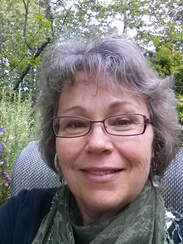What can the COVID-19 Crisis Teach us About Preparing for Death?Strange times we are living in. And, as always, there is something to be learned in adversity. I am noticing that questions related to death and preparation for it are burbling to the surface for me and for other people right now. How did we get here? During the last century, in western settler cultures in particular, we have taken death largely out of our homes and away from our faith communities and handed it off to the experts. Medical folks, funeral directors, hospices, hospitals, long term care homes. This is where and how death is managed now. Consequently, we have lost skills. We don’t see or handle or anoint dead bodies anymore. Most of us don’t know what to do or how to be when sitting with a dying loved one or a woman who has just miscarried. No one modelled that for us, and we can’t model it for others. We often allow the professionals to mediate the experience for us. We don’t trust our instincts. No one is laid out in the front parlour anymore. Most of us don’t live on farms or hunt for our food so we are removed from the natural cycles of birth and death amongst animals. How do we experience death and dying now? Death is mostly an individual event in our lives and the lives of our families. It is less and less a community event. We speak in hushed tones. We don’t know much about how to move through grief or support others moving through it. The rituals and signposts of mourning are fading in our collective memories.
That is certainly how I felt witnessing the dying of my mother-in-law and my father a number of years ago. They did not seem prepared and I did not know what they wanted or how best to support them. Or even talk with them about what was going on. That felt empty and lonely and unsatisfying – as if I had somehow failed at something where no-one had explained the rules of the game to me. How is COVID-19 impacting this? Into this social context comes COVID-19. Suddenly pictures and statistics and warnings about death are taking up the entire media landscape. We get hour by hour updates on the number of deaths and detailed stories of how people died and the stresses on the people caring for them. It isn’t just the occasional life event that we stumble through now. We can’t escape it. Our fear and denial are harder to hide. Maybe this is an opportunity… How could we make this a positive thing? What if instead of allowing this to ratchet up our fear of death, and running from it, we turn around, face it, and allow ourselves to actually feel it and see where that takes us? What if that created opportunities to contemplate our own mortality, to make plans to guide our loved ones when our time comes, to think about our legacy and how we want to be remembered? What if we brought the idea of death into the light and turned that fear into positive action? What if we took some of this ‘found time’, now that our busy busy lives have been slowed down, to take control of some small things that we can. Like making a will or an advance care plan? Like telling stories about elders and ancestors to grandchildren? Like pre-paying for our funerals? Like writing our life story or love letters to unborn descendants? What if we actually did some of that? What might happen? Being more prepared can soften our fear What if taking control of some concrete actions actually softened our fear? What if it made us more mindful after this is all over? What if we had a clearer sense of what is most important in life? And allowed that to guide us in the days ahead? Death doulas witness this all the time with people who are near the end of their lives. Facing their fear and taking concrete steps to influence the kind of death and legacy they want really can soften people’s fear. It could help all of us right now. Because, while any single one of us is very unlikely to die from COVID-19, we will all die at some point. And so will everyone we love. We don’t know when or how. So why not take this time to be just a bit better prepared? Perhaps you will feel a little less afraid as a result. I know I felt better after letting my husband and grown children know that in the current circumstances, I would not want to be put on a ventilator if it came to that. I don’t want to burden them or the doctors with not knowing my wishes. I have already lived a full life and would rather a ventilator go to someone younger – that children lose a grandparent in this epidemic rather than a parent. Sharing my wishes with my loved ones is one action I have taken to be better prepared for my eventual death. What’s yours? CIRCLESPACE'S NEWEST FREE RESOURCE
Caring from Afar: Staying Connected and Saying Good-Bye During Physical Distancing How do we show our love when we can’t be there to hold a loved one who is ill? How do we accompany them through the dying process if we can’t be physically present? This resource offers 6 steps to comfort people who are separated from their ill or dying loved one. It includes ideas for how to stay connected and ways to honour your grief through these unprecedented times.
2 Comments
|





 RSS Feed
RSS Feed
